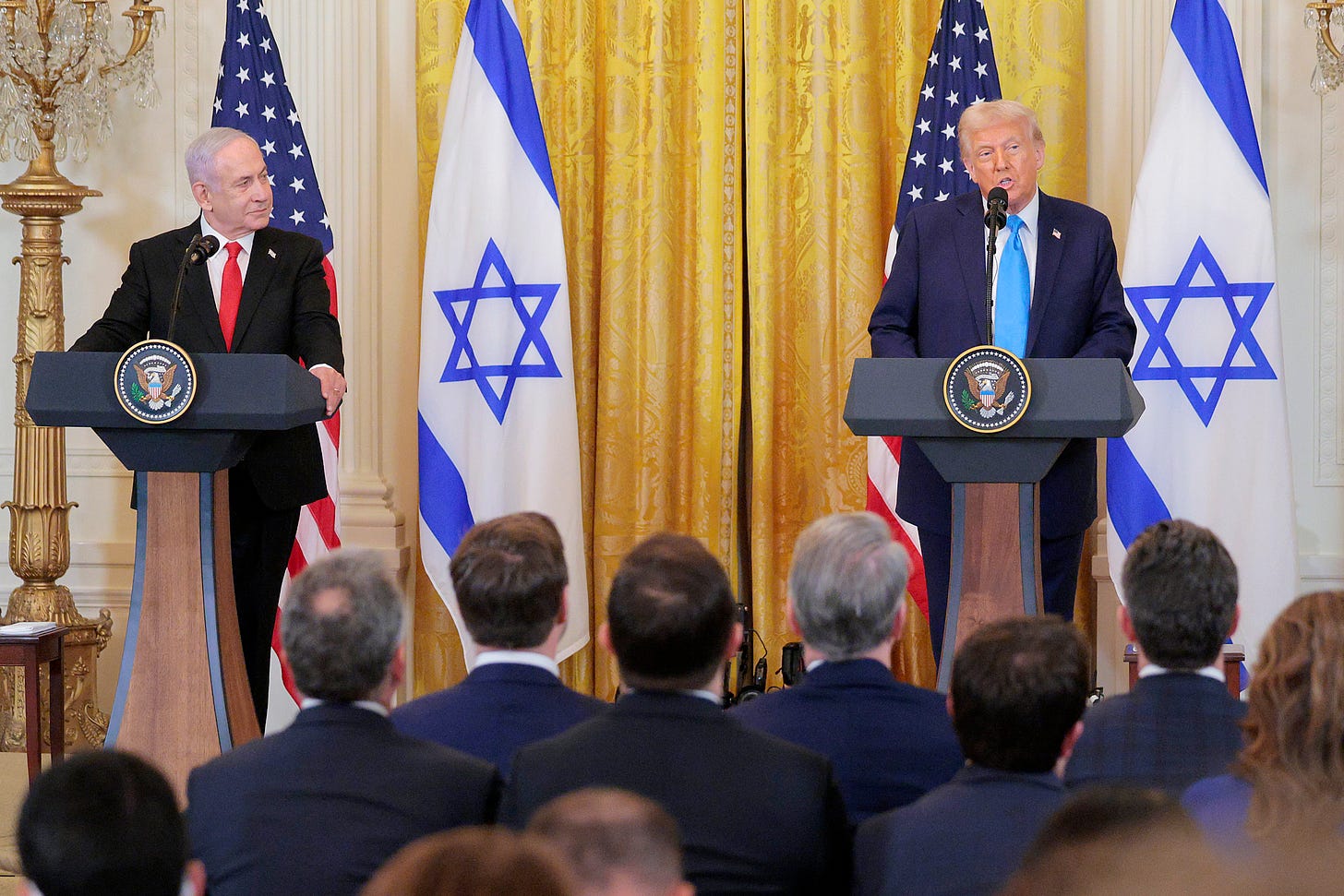This Wasn't in the Campaign Speeches
When Israeli Prime Minister Benjamin Netanyahu arrived at the White House in April, he got a diplomatic shock.
Netanyahu had anticipated that the president might announce new tariff agreements or expanded defense partnerships. What he heard instead was Trump's bombshell declaration that the United States was actively negotiating a nuclear deal with Iran — Israel's most dangerous enemy. The stunned silence that followed spoke volumes about how dramatically the relationship had shifted.
The message was clear: Trump was prioritizing his vision for America's future in the Middle East over its longstanding allegiance to Israel. But where does that leave Israel, and why should Americans care about this fundamental shift in foreign policy?
Spring’s diplomatic bombshells
That April meeting was the first clear signal that Trump 2.0 would operate differently from the way he did in his first term.
Back then, he withdrew from the nuclear deal Obama had negotiated with Iran, which had allowed it to enrich uranium for civilian use in exchange for not building atomic weapons. Trump’s move was controversial, and the Iran nuclear agreement enjoyed wide support among diplomats. But Israel wanted the deal abandoned, since it views Iran as an existential threat and doesn’t trust Iran to abide by its commitments.
This time, sitting across from Trump in the Oval Office, Netanyahu found himself blindsided. He was learning for the first time that America would again pursue the kind of diplomatic engagement with Tehran that Israel had spent years trying to prevent. Trump was making it clear that Israeli security concerns would not derail American diplomatic initiatives.
Trump followed that up a few weeks later by negotiating directly with Hamas to secure the release of American hostage Edan Alexander, cutting Israeli officials out of the talks entirely. That too was a different approach — America had previously kept Israel in the loop.
Then Trump struck a ceasefire deal with the Houthis in Yemen, Iranian-backed rebels who have launched missiles at cargo and military vessels in the Red Sea as well as many targets in Israel. The deal excluded any agreement for the Houthis to stop attacking Israel, even as the group kept up its barrages on the nation’s cities.
These shifts represent much more than a few policy disagreements between allies. They show Trump's willingness to pursue his transactional “America First” vision for the Middle East regardless of Israel's needs.
The Middle East tour: Skipping Israel, embracing the Gulf
Trump's May tour of Saudi Arabia, Qatar, and the UAE drove home the new approach. The trip's most telling aspect wasn't just that Israel was conspicuously absent from the itinerary — it was how enthusiastically Trump embraced partnerships and policies that directly contradicted Israeli interests.
He lifted sanctions on Syria despite the vigorous objections of Netanyahu, who does not trust Syria’s government and has ordered attacks on Syrian military assets to keep them from threatening Israel. Trump described the removal of sanctions on Syria as a personal favor to Saudi Crown Prince Mohammed bin Salman, who had lobbied Trump for the change.
"Oh, what I do for the Crown Prince," Trump said to knowing laughter from Saudi business leaders at an investment summit in Riyadh packed with American CEOs. But it wasn’t just a favor: Saudi Arabia had pledged $600 billion in US investments.
Other Arab states made similar efforts to purchase influence. Qatar offered a $400 million luxury aircraft to the US for Trump’s use, and the UAE committed $1.2 trillion to American aviation, defense, and technology firms. For a president who measures success in deal flow, these figures dwarf anything that Israel brings to the table. Each announcement sent the same message: America’s decisions would prioritize its own economic interests more highly than Israeli security and diplomatic preferences.
The Iran gambit: Diplomacy over Israeli concerns
Even more consequential was the shift on Iran. In his first term, after he withdrew from Obama’s nuclear deal, Trump pursued a policy of “maximum pressure” sanctions on Iran and even ordered the assassination of an important Iranian general. All of this hewed to the preferences of Israel.
Trump 2.0, on the other hand, is betting on dealmaking. After seven weeks of negotiations led by US Middle East Envoy Steve Witkoff, the administration believes it can secure Iranian agreement to abandon uranium enrichment entirely — something previous agreements never achieved. When Netanyahu considered preemptive strikes on Iranian nuclear facilities earlier this year, Trump personally warned him against any action that could jeopardize negotiations. As Trump put it during a White House press conference, "I told him this would be very inappropriate to do right now, because we're very close to a solution.
And in another sign of declining Israeli influence, the Saudis have positioned themselves as key facilitators for these Iran talks — something that would have been unthinkable under previous administrations. For years, Arab leaders had assumed that “the road to Washington runs through Jerusalem.” Now it seemed to go through Riyadh instead.
Gaza: The final straw
But it's the ongoing war in Gaza that officials and diplomats say has pushed Trump's patience to the breaking point. Last week he told reporters on Air Force One that he wants Israel to end the war “as quickly as possible," even as Netanyahu oversaw a major new military offensive there. Gaza has become something Trump campaigned against: a "forever war" that brings negative headlines and costs billions of dollars, all while offering no clear path to victory or economic gain.
After 18 months of conflict, the Gaza humanitarian crisis has generated global outrage that threatens to undermine Trump's broader Middle East agenda, which in large part depends on Israeli peace with Arab neighbors. Images of suffering Palestinian children and widespread destruction have intensified international condemnation, with even traditionally supportive European allies like Britain and France threatening sanctions against Israel.
Netanyahu's refusal to accept hostage deals that would end military operations has particularly frustrated Trump, officials say. Despite opportunities for prisoner exchanges that could secure the release of remaining Israeli hostages, Netanyahu has repeatedly balked at agreements that would require halting the war. This has left Hamas weakened but not destroyed, creating a stalemate that has only prolonged the suffering of both Palestinians and the hostages’ families.
Arab states are eager to begin reconstruction efforts and help establish a Palestinian government other than Hamas. They view continued Israeli military operations as obstacles to the economic development projects that could transform the region, and Trump heard this message repeatedly during his Middle East tour.
What this means for Israel and Americans
For Israel, Trump’s shift leaves Israel increasingly isolated and facing something unprecedented: sustained public pressure from its closest ally. For Americans, it reflects recognition that prolonged conflicts drain resources without delivering tangible benefits to workers and businesses.
The Gulf partnerships promise immediate returns: semiconductor deals that could strengthen US competitiveness in artificial intelligence, Saudi investments spanning manufacturing and infrastructure that create American jobs, and more stable energy markets through prioritized relationships with major oil producers.
Yet this approach may be strategically shortsighted. Israel remains America's most reliable intelligence partner in a volatile region, sharing critical information about Iranian activities and terrorist networks that no amount of Saudi investment can replace. More fundamentally, Israel is the Middle East's only functioning democracy, sharing core American values that align naturally with US interests.
Trump's current diplomatic opportunities exist precisely because of Israel's military successes. The crushing defeats it inflicted on Iranian-backed paramilitary groups like Hamas and Hezbollah are what made Iran more willing to negotiate and prompted Saudi Arabia and other Gulf nations to see a weakened Iran as a problem they could live with. For Israel, which Iran has vowed to wipe off the face of the earth, Iran’s threat continues to be an existential one. Trump is essentially cashing checks written by Israeli blood and treasure and then questioning the value of the account holder.
The bottom line
In Trump’s universe, loyalty is measured in dollars and diplomatic wins. Right now, the Gulf states are outbidding everyone else. And so the era of automatic American deference to Israeli policy preferences is ending.
What emerges in its place will depend on how Israel adapts to a world where even its closest ally offers transactional rather than unconditional support. But for Trump, the calculation is simple: pursue deals that strengthen America’s influence and economic position, regardless of who gets sacrificed in the process.










Trump is all about Trump. No country can see the US as a true ally as long as he is in office. Ukraine wisely decided not to tell the US of their big strikes in Russia.
As long as everything is transactional, we have no foreign policy under this administration.
It’s a little bizarre to say Israel is a democracy aligned with American values. Netanyahu is a war criminal committing genocide with new war crimes being reported daily. Innocent civilians are being starved. And this is all happening with American funding. This is the great evil of our time.